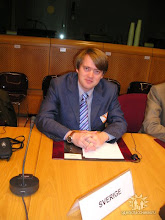This man spoke nine languages and was able to read fourteen. He studied in France, Italy and Germany, represented his native country at international law conferences, fought a guerrilla war against Nazism, held professorships at the Universities of Stockholm (Sweden), Duke, Yale and Princeton (United States), acted as an advisor to Justice Robert Jackson at the Nuremberg trial, received the Grand Cross of Cespedes from Cuba in 1950 and the Stephen Wise Award of the American Jewish Congress in 1951, was nominated by Winston Churchill for the Nobel Peace Prize in 1950, and again in 1952, and in 1989 was awarded posthumously the Roosevelt Freedom Medal for his enduring contribution to the principle of the freedom of worship. He probably made his name immortal for all students of international law in that he had drafted the Convention for the Prevention and Punishment of the Crime of Genocide.[1] And yet, towards the end of his remarkable life, he still unassumingly referred to himself as an "unofficial" man... His name was Raphael Lemkin.
As the major accomplishment of his life turned sixty on 9 December 2008, and fifty years would have elapsed, in 2009, after Raphael Lemkin's death, it seems appropriate to honour his name and his contribution to international law which, after him, would not be the same as it was before. Over the years of his unceasing efforts to promote the Convention, he was regarded by some sceptics as a "dreamer" and a "fanatic". However, his contribution to international law is certainly more significant than the convincing force of his critics' arguments. The Convention he had proposed established an international criminal law regime for the suppression of a heinous crime which had hitherto remained unpunished. It is true that the Convention was in itself not sufficient to avert the occurrence, in the 1990s, of the crime of genocide in the former Yugoslavia and Rwanda.[2] In the language of the Convention's Preamble, "in order to liberate mankind from such an odious scourge",[3] a more consistent international cooperation – in other words, a stronger political will combined with an earnest humanitarian conscience – should also be there. And it was precisely this essential condition that Raphael Lemkin pointed to just over two years before the Convention was adopted.[4] Now, six decades after the pioneering event, it may be wise to remember an outstanding lawyer who made his dream of a better international law come true.
[1] The Convention was adopted by Resolution 260 (III) A of the United Nations General Assembly on 9 December 1948. Despite some critical views on the value of the Convention, such as those of James J. Martin (1916 – 2004), it did become, over decades, more influential than it could have possibly been in Raphael Lemkin's lifetime. As of 18 July 2007, the Convention had 140 States parties. For ratification status, see UNCHR website <http://www2.ohchr.org/english/bodies/ratification/1.htm>, accessed 10 February 2009
[2] See Swissinfo, "Value of UN Genocide Convention Questioned", Human Rights Tribune website <http://www.humanrights-geneva.info/Value-of-UN-Genocide-Convention,3933>, accessed 10 February 2009
[3] 3rd preambular paragraph
[4] R. Lemkin, "Genocide", American Scholar, volume 15, No. 2 (April 1946), pp. 227 – 230, at 230
Subscribe to:
Post Comments (Atom)

No comments:
Post a Comment